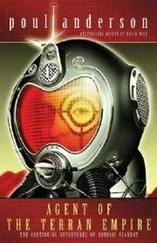Poul Anderson - Star of the Sea
Здесь есть возможность читать онлайн «Poul Anderson - Star of the Sea» весь текст электронной книги совершенно бесплатно (целиком полную версию без сокращений). В некоторых случаях можно слушать аудио, скачать через торрент в формате fb2 и присутствует краткое содержание. Жанр: Фантастика и фэнтези, на английском языке. Описание произведения, (предисловие) а так же отзывы посетителей доступны на портале библиотеки ЛибКат.
- Название:Star of the Sea
- Автор:
- Жанр:
- Год:неизвестен
- ISBN:нет данных
- Рейтинг книги:5 / 5. Голосов: 1
-
Избранное:Добавить в избранное
- Отзывы:
-
Ваша оценка:
- 100
- 1
- 2
- 3
- 4
- 5
Star of the Sea: краткое содержание, описание и аннотация
Предлагаем к чтению аннотацию, описание, краткое содержание или предисловие (зависит от того, что написал сам автор книги «Star of the Sea»). Если вы не нашли необходимую информацию о книге — напишите в комментариях, мы постараемся отыскать её.
Star of the Sea — читать онлайн бесплатно полную книгу (весь текст) целиком
Ниже представлен текст книги, разбитый по страницам. Система сохранения места последней прочитанной страницы, позволяет с удобством читать онлайн бесплатно книгу «Star of the Sea», без необходимости каждый раз заново искать на чём Вы остановились. Поставьте закладку, и сможете в любой момент перейти на страницу, на которой закончили чтение.
Интервал:
Закладка:
“And also when you are present at certain episodes. I know.” He wanted to kiss the unhappiness off her lips. Should I try? Could I?
“Yes.” The bright head lifted, the voice throbbed. “But then I think of the exploring, the discovering, the helping, and I am glad again.”
“Good lass. Well, tell me about your adventures.” A slow lead-up to the real question. “I haven’t retrieved your report yet, because I wanted to hear it from you personally.”
Her spirit flagged. “You had better get the report if you are interested,” she said, looking across the room to the picture of the Veil Nebula.
“What? . . . Oh. Tough for you to talk about.”
“Yes.”
“But you did succeed. You did get history secured, and in the right pattern, with peace and justice.”
“A measure of peace and justice. For a time.”
“That’s the best human beings can ever expect, Janne.”
“I know.”
“We’ll skip the details.” Were they really that gory? My impression was that reconstruction went pretty smoothly, and the Low Countries did rather well in the Empire till it started coming apart. “But can’t you tell me a few things? What about the people we met? Burhmund?”
Floris’s tone lightened a bit. “He received amnesty, like everyone else. His wife and sister were restored to him unharmed. He retired to his lands in Batavia, where he ended his days modestly prosperous, a kind of elder statesman. The Romans, too, respected and often consulted him.
“Cerialis became governor of Britain, where he conquered the Brigantes. Tacitus’s father-in-law Agricola served under him, and you may recall that the historian rates him well.
“Classicus—”
“Never mind for now,” Everard interrupted. “Veleda-Edh?”
“Ah, yes. After bringing about that meeting at the river, she disappears from the chronicle.” The complete chronicle, retrieved by time travelers.
“I remember. How come? Did she die?”
“Not for another twenty years. A ripe old age in that era.” Floris frowned. Did dread touch her anew? “I wondered. You would think her fate would interest Tacitus enough for him to mention it.”
“Not if she went into obscurity.”
“She didn’t, quite. Could it be that I was making my own change in the past? When I reported my doubts, I was ordered to proceed and told that in fact this was a proper part of history.”
“Okay, then it was. Don’t worry. It could be a trivial glitch in causality. If so, it doesn’t matter. That kind happens a lot, and has no consequences of any importance. Or it could straightforwardly be due to Tacitus not knowing or caring what became of Veleda after she ceased to be a political force. She did, didn’t she?”
“In a way. Although—The program I thought of and suggested, and that the Patrol approved, it occurred to me because of what I knew, what I had seen, before I had any idea the Patrol exists. I heartened Edh, foretold what she would and must do, saw to the necessary arrangements, watched over her, appeared to her whenever she seemed to need her goddess—” Again Everard saw Floris troubled. “The future was creating the past. I hope I will escape any more such experiences. Not that this was horrible. No, it was worthwhile, I felt that it justified my life. But—” Her voice faded away.
“Eerie,” Everard supplied. “I know.”
“Yes,” she said softly, “you have your own secrets, don’t you?”
“Not from the Patrol.”
“From those you care about. Things that would hurt you too much to speak of, or would hurt them too much to hear.”
This is cutting near the bone. “Okay, what about Edh? I trust you made her as happy as possible.” Everard paused. “I’m sure you did.”
“Were you ever on the island of Walcheren?” Floris asked.
“M-m, no. Down close to the Belgian border, isn’t it? Wait. I’ve a vague recollection you once made a remark about archaeological finds there.”
“Yes. They are mostly stones with Latin inscriptions, from about the second and third centuries. Thank offerings, usually for a safe voyage to Britain and back. The goddess to whom they are dedicated had a temple at one of the North Sea ports of embarkation. She is represented on some of the stones, with a ship or a dog, often bearing a horn of plenty or surrounded by fruit and grain. Her name was Nehalennia.”
“Fairly important, then, at least in that area.”
“She did what gods are supposed to do, gave courage and solace, made men a little more decent than they might otherwise have been, and sometimes opened their eyes to beauty.”
“Wait!” Everard sat straight. A prickling went up his spine and over his scalp. “That deva of Veleda’s—”
“The ancient Nordic goddess of fertility and the sea, Nerthus, Niaerdh, Naerdha, Nerha, many different versions of the name. Veleda made her the avenging deity of war.”
Everard regarded Floris for an intense moment before he said, “And you got Veleda to proclaim her once more peaceful and bring her south. That’s as . . . as marvelous an operation as I’ve ever heard of.”
Her glance dropped from his. “No, not really. The potential was there, above all in Edh herself. What a woman she was. What might she have done in a luckier age? . . . On Walcheren the goddess was called Neha. She had become minor, even as an agricultural and maritime divinity. A primitive association with hunting still clung to her. Veleda arrived, revitalized the cult, gave it fresh elements suited to the civilization that was transforming her people. They came to speak of the goddess with a Latin tag, Neha Lenis, Neha the Gentle. In time that turned into Nehalennia.”
“She must have mattered a lot, if they worshiped her centuries later.”
“Evidently. Sometime I would like to trace out the history, if the Patrol can spare that much lifespan of mine.” Floris sighed. “In the end, of course, the Empire collapsed, the Franks and Saxons ravaged around, and when a new order of things arose it was Christian. But I like to imagine that something of Nehalennia lingered on.”
Everard nodded. “Me too, from what you say. It could well have. A lot of medieval saints were pagan gods in disguise, and those that were historical often took on attributes of the gods, in folklore or in the Church itself. Midsummer fires were still lighted, though it was now the Eve of Saint John. Saint Olaf fought trolls and monsters like Thor before him. Even the Virgin Mary has aspects of Isis, and I daresay quite a few legends about her were originally local myths. . . .” He shook himself. “You’re familiar with this. And it is straying kind of far. How was Edh’s life?”
Floris looked beyond him and this year. Her words flowed slow. “She grew old in honor. She never married, but she was like a mother to the people. The island was low, a birthplace of ships, like her girlhood home, and the temple of Nehalennia stood on the edge of her beloved sea. I think—I can’t be sure, for how much can a goddess know of a mortal’s heart?—I think she became . . . serene. Is that what I am trying to say? Certainly as she lay dying—” The voice caught. “—as she lay on her deathbed—” Floris fought the tears and lost.
Everard drew her to him, put her head on his shoulder and stroked her hair. Her fingers clutched at his shirt. “Easy, lass, easy,” he whispered. “Some memories will always hurt. You came to her that one last time, didn’t you?”
“Yes,” she mumbled against him. “What else could I do?”
“Sure. How could you not have? You eased her passing. What’s wrong with that?”
“She—she asked—and I promised—”
Floris wept.
“A life beyond the grave,” Everard realized. “A life with you, forever in the sea-home of Niaerdh. And she went happily into the dark.”
Читать дальшеИнтервал:
Закладка:
Похожие книги на «Star of the Sea»
Представляем Вашему вниманию похожие книги на «Star of the Sea» списком для выбора. Мы отобрали схожую по названию и смыслу литературу в надежде предоставить читателям больше вариантов отыскать новые, интересные, ещё непрочитанные произведения.
Обсуждение, отзывы о книге «Star of the Sea» и просто собственные мнения читателей. Оставьте ваши комментарии, напишите, что Вы думаете о произведении, его смысле или главных героях. Укажите что конкретно понравилось, а что нет, и почему Вы так считаете.










